Bracketing Paradoxes Revisited: Fresh Experimental Insights and a New Reanalysis
Stuttgart 14.01.2025
Titus von der Malsburg
titus.von-der-malsburg@ling.uni-stuttgart.de
Universität Stuttgart
Institut für Linguistik
Nominal compounds

der Obstbaum
the fruit tree

das Obst
the fruit

der Baum
the tree
Singer-Songwriter, Denkfehler, Kuscheltier
Modification with adjectives
Same syntactic structure, seemingly different semantic structures, which violates the Principle of Compositionality.
the Ukrainian tomb of a (Roman) prince
the tomb of a Ukrainian prince
Bracketing paradox! Not compositional?
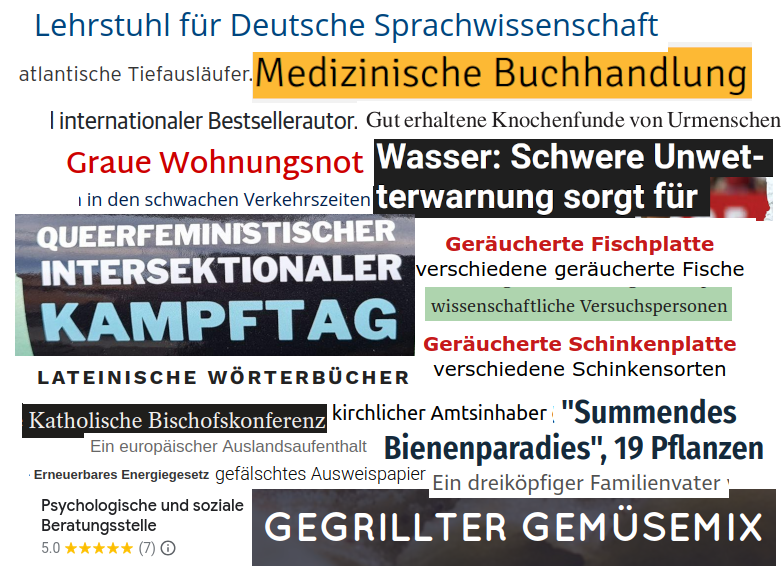
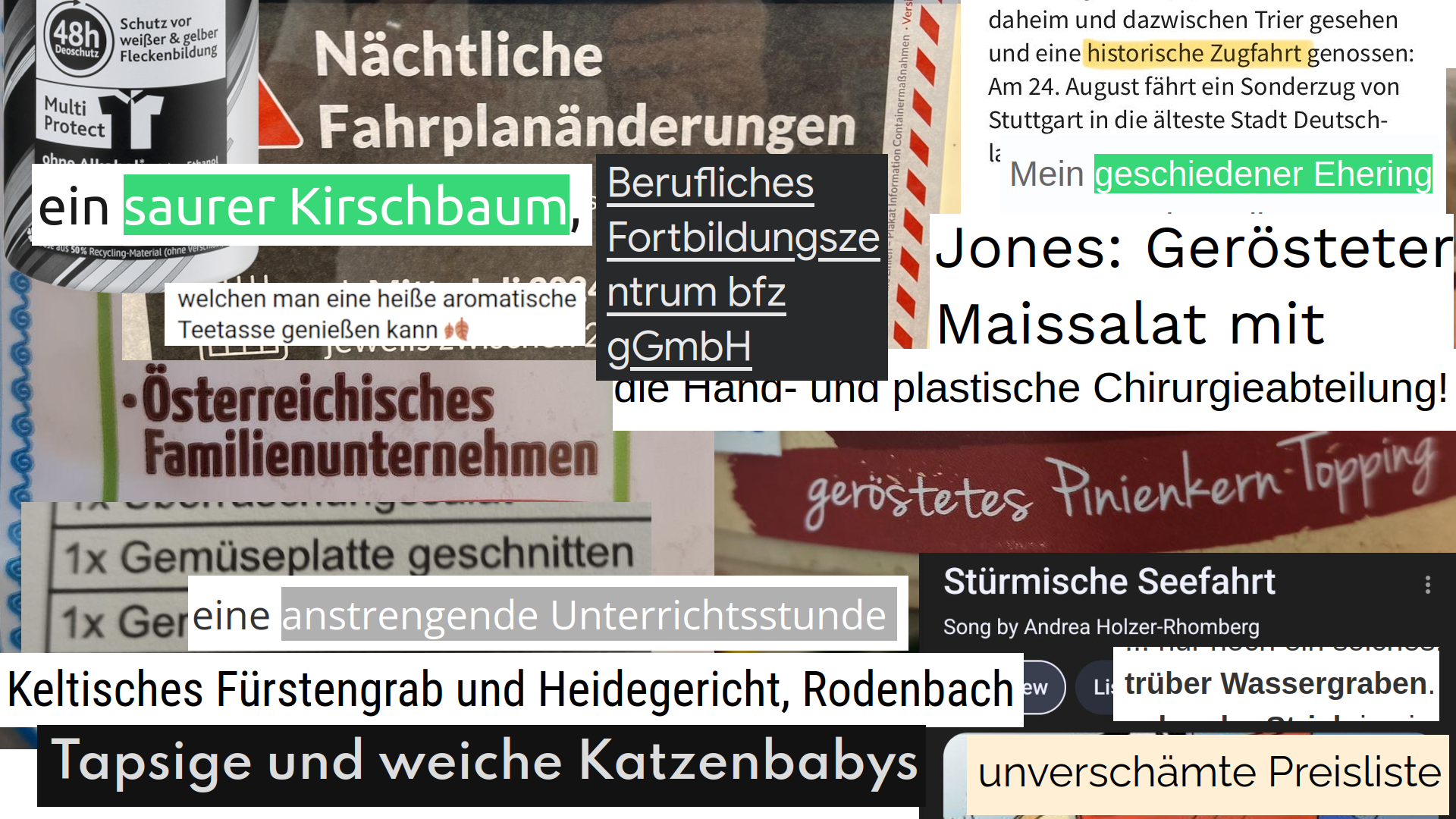
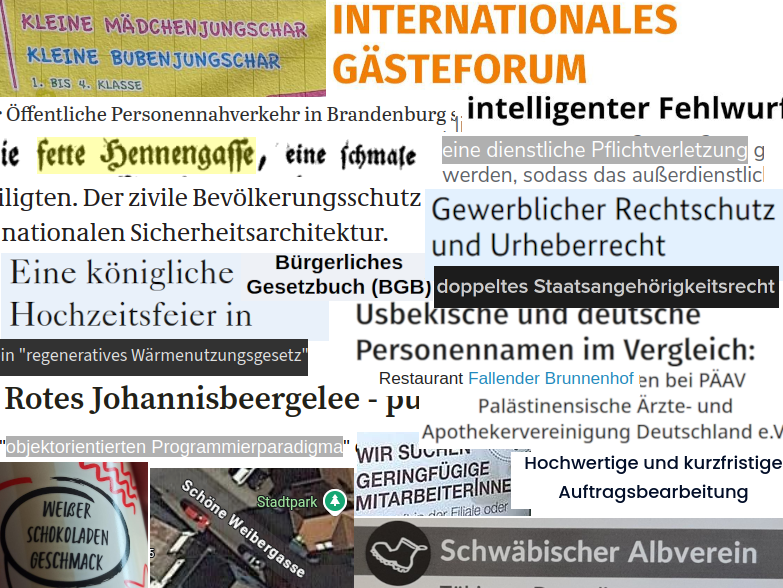
The canonical reading is the norm. Some phrases are ambiguous or are even preferentially interpreted as a bracketing paradox.
steiniger Fahrradweg stony bike path
→ canonical reading
königliche Hochzeitsfeier royal wedding celebration
→ canonical and bracketing paradox reading
saurer Kirschbaum sour cherry tree
→ only bracketing paradox reading
?? dreiköpfiger Familienvater 3 headed family father
→ father of a family of 3 vs. Cerberus
What licenses the bracketing paradox reading?
How are bracketing paradoxes processed?
There is hardly any psycholinguistic research on this topic!
Mistakes, humor, pragmatics,
plausibility, context, world knowledge,
semantic transparency, language economy,
information density, adjective semantics,
lexicalization of the compound noun,
internal compound semantics,
semantic agreement,
morphosyntactic congruency
between adjective and noun
Experiment 1
Do the semantic agreement and the morphosyntactic congruence between the adjective and the individual nouns affect the acceptability of the entire phrase?
Method

204 adjective+NN compound phrases from literature, newspaper articles
Interpretation: canonical, ambiguous, bracketing paradox
Constructions where the adjective does not match any of the nouns → unlikely to be used

saurer Kirsch
sour cherry
AN1

saurer Baum
sour tree
AN2

saurer Kirschbaum
sour cherry tree
AN1N2
Scales
Comprehensibility judgments were highest, but the scales were highly correlated (R ≥ 0.94)
→ measure related concepts
[0-1] scaled mean for analyses
Semantic agreement
Semantic agreement: Predictions
Strict compositionality: N2 is the head noun.
AN1N2 ratings rise when AN2 ratings rise
high agreement → canonical reading
AN1 ratings should not influence AN1N2 ratings
high agreement → bracketing paradox potential
Semantic agreement: Results
Strict compositionality: N2 is the head noun.
AN1N2 ratings rise when AN2 ratings rise
high agreement → canonical reading
AN1N2 ratings rise when AN2 ratings rise
high agreement → canonical reading
AN1 ratings should not influence AN1N2 ratings
high agreement → bracketing paradox potential
AN1N2 ratings rise a bit when AN1 ratings rise
high agreement → bracketing paradox potential
AN1 × AN2 interaction
High AN1 and AN2 agreement reduced AN1N2 ratings.
Morphosyn. congruency: Predictions
The morphosyntactic features of the adjective must agree with N2.
The morphosyntactic congruency between the adjective and N1 increases bracketing paradox potential.
| schwerefem/neut/plsevere | Unwetterneut/plstorm | warnungfemwarning | ✔ |
| königlichefem/neut/plroyal | Hochzeitsfemwedding | feierfemcelebration | ✔ |
| saurermascsour | Kirschfemcherry | baummasc tree | ✘ |
| dreiköpfigermasc 3-head | Familienfem/plfamily | vatermascfather | ✘ |
Morphosyn. congruency: Results
The morphosyntactic features of the adjective must agree with N2.
The morphosyntactic congruency between the adjective and N1 had no effect.
Experiment 1 summary
Both nouns have a positive effect on the acceptability of an adjective and NN-compound phrase.
If the adjective matches both nouns, there is a conflict or competition between them.
The morphosyntactic congruence between the adjective and the non-head noun has no effect.
Comprehensibility, naturalness, and stylistic form are related concepts.
neidischer Zickenkrieg 🗲 jealous catfight
semantic agreement ✔ morphosyntactic congruency ✘
Experiment 2
Which noun in a compound is the adjective attached to?
Predictions
Strict compositionality: The adjective attaches to N2.
N2 is chosen more often than N1
N1 is chosen more often than N2
N1 is chosen as often as N2
? chosen often
Adjective N1 morphosyntactically
Canonical
Bracketing paradox
Ambiguous
no interpretation
N1 attachment facilitated
The semantic agreement ratings from Experiment 1 should align with the selected attachment site.
Results: Attachment preference
N2 was chosen overall more often than N1
N1 was sometimes chosen more often than N2
N1 was sometimes chosen as often as N2
? chosen often
grammatical, canonical
bracketing paradox, not compositional?
ambiguous or bracketing paradox?
almost always interpreted
Attachment and AN2 ratings: Predictions
The compatibility ratings should match the attachment site.
A N2 → ¬N1
The compatibility ratings should match the attachment site.
A N1 → N1
Attachment and AN2 ratings: Results
The compatibility ratings should match the attachment site.
A N2 → ¬N1
The compatibility ratings match the attachment site.
A N1 → ¬N1
The compatibility ratings should match the attachment site.
A N1 → N1
The compatibility ratings match the attachment site.
A N1 → N1
Morphosyntactic congruency: Predictions
The morphosyntactic match between adjective and N1 should facilitate a bracketing paradox reading.
Morphosyntactic congruency: Results
The morphosyntactic match between adjective and N1 facilitates a bracketing paradox reading, but its influence is dwarfed by semantic agreement.
Experiment 2 summary
Participants did not opt out of interpreting the phrases, but often disagreed what the interpretation is.
Most phrases received a canonical interpretation, but N1 was often an appropriate attachment noun.
Semantic agreement determines interpretational preferences, but morphosyntactic adjective and N1 match also facilitates a bracketing paradox reading.
semantic agreement ✔ morphosyntactic congruency ✔
Processing
Reaction times and ratings
Participants needed a little more time to decide in favor of N1.
Semantic agreement between adjective and noun shortened the reaction time.
If none of the nouns matched the adjective, participants took a long time to decide.
In Experiment 2, semantic agreement between adjective and noun accelerated the decision making.
In Experiment 1, there was a conflict or competition between the nouns.
\(\rightarrow\) ambiguity resolution, reinterpretation
Garden-path effect?
Experiment 4
Does context improve the interpretation of bracketing paradoxes?
Im Elternabend berichtete der dreiköpfige Familienvater von seinen Erfahrungen im Zwiespalt zwischen Familie und Beruf.
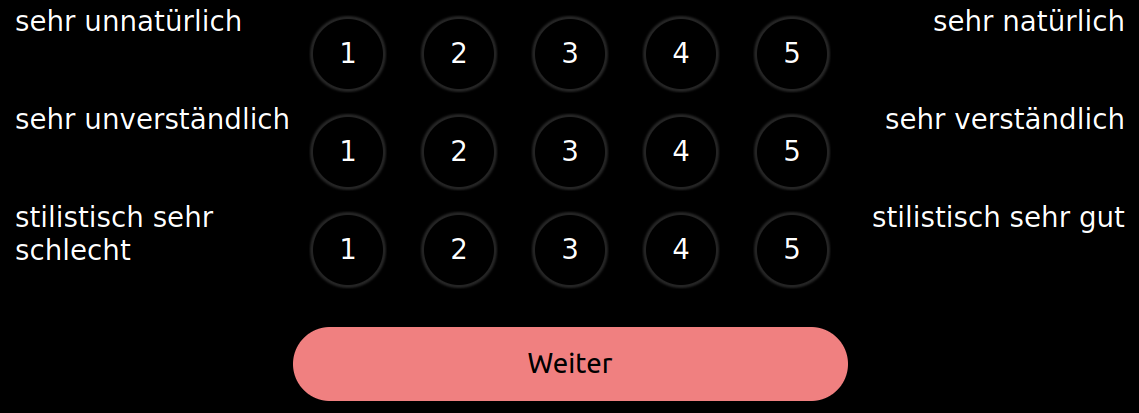
At the parents' evening, the father of three reported on his experiences of the conflict between family and career.
Ratings: Predictions
Bracketing paradoxes are embedded in a sentence will be rated higher.
Morphosyntactic congruency ??
Ratings: Results
Bracketing paradoxes are embedded in a sentence will be rated higher.
Bracketing paradoxes are embedded in a sentence are rated somewhat higher; canonical phrases also benefit.
Bracketing paradoxes received lower ratings.
Morphosyntactic congruency ??
Morphosyntactic congruency ??
Scales: Predictions
Experiment 1
Scales: Results
Experiment 1
Experiment 4
Experiment 4 summary
Sentence context improves phrase acceptability overall, but bracketing paradoxes benefit more than canonical phrases.
Comprehensibility, naturalness, and stylistic form are related concepts.
The findings are consistent with Experiments 1 and 2.
semantic agreement morphosyntactic congruency ✘ communicative relevance ✔
Experiment 5
Does context influence which noun in a compound is the adjective attached to?
Attachment preference: Predictions
Strict compositionality: N2 is the head noun.
Experiment 2 → There will be a variety of interpretations.
N2 is chosen more often than N1
N1 is chosen more often than N2
N1 is chosen as often as N2
? chosen often
Canonical
Bracketing paradox
Ambiguous
no interpretation
Sentence context licenses a bracketing paradox interpretation.
Attachment preference: Results
Phrase ratings and attachments: Predictions
Experiment 2 The compatibility ratings should match the attachment site.
A N2 → ¬N1
Experiment 2 The compatibility ratings should match the attachment site.
A N1 → N1
Phrase ratings and attachments: Results
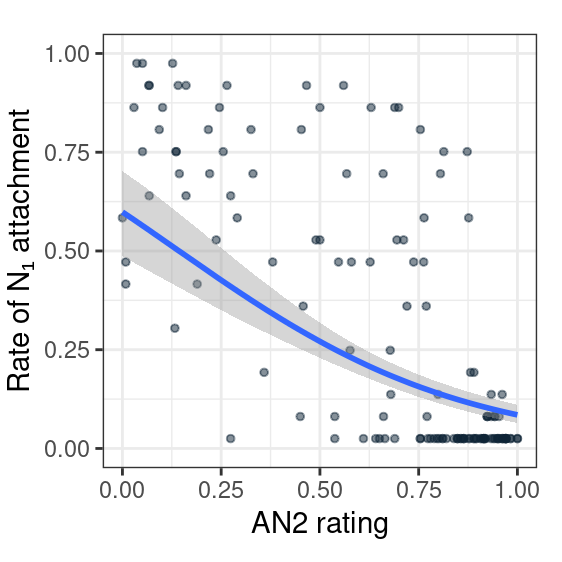
Experiment 2 The compatibility ratings should match the attachment site.
A N2 → ¬N1
Experiment 5 The compatibility ratings match the attachment site.
A N2 → ¬N1
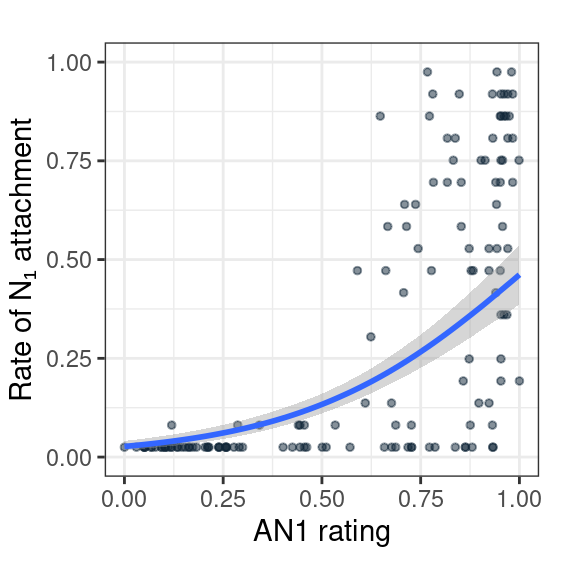
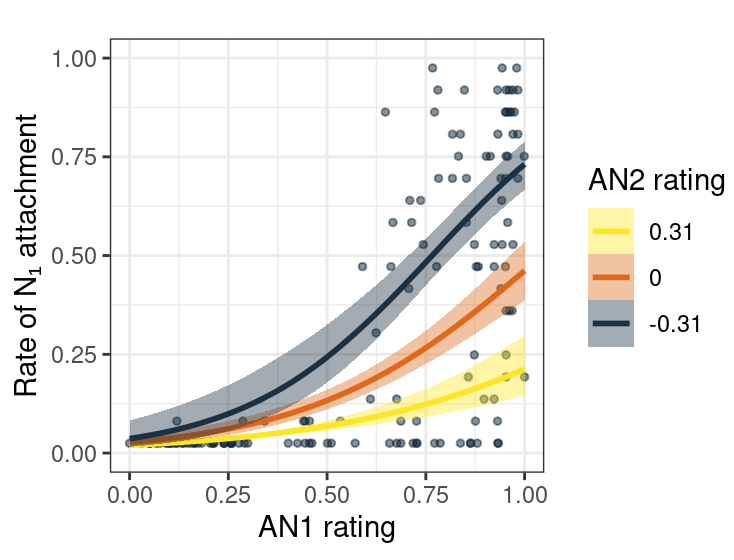
Experiment 2 The compatibility ratings should match the attachment site.
A N1 → N1
Experiment 5 The compatibility ratings match the attachment site.
A N1 → N1
AN1 × AN2 interaction N1 attachments were higher when A N1 and A 🗲 N2
Sentence ratings and attachments: Predictions
The attachments in sentences should correspond to attachments in bare phrases.
Experiment 5 ≈ Experiment 2
Sentence ratings and attachments: Results
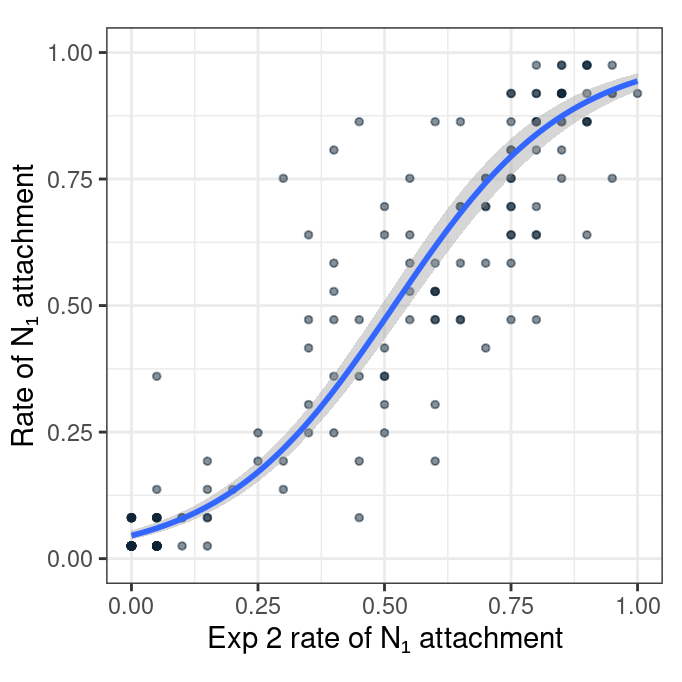
The attachments in sentences should correspond to attachments in bare phrases.
Experiment 5 ≈ Experiment 2
The attachments in sentences corresponded to attachments in bare phrases.
Experiment 5 ≈ Experiment 2
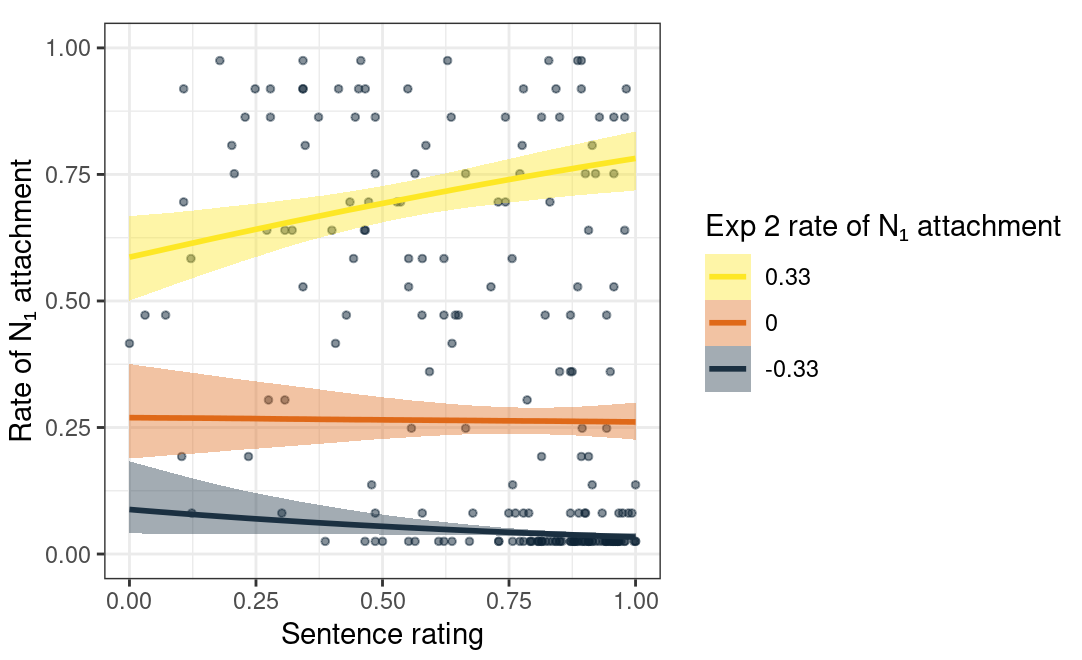
When sentence ratings were high, more N1 attachments in bare phrases translated to more N1 attachments in sentences.
Conclusions
The bracketing paradox interpretation is determined primarily by semantic agreement.
Morphosyntactic agreement between the adjective and non-head noun plays a smaller role.
Bracketing paradoxes benefit disproportionately from sentence context compared to canonical phrases.
Processing bracketing paradoxes resembles ambiguity resolution in garden-path sentences.
Future work
Mistakes, humor, pragmatics,
plausibility, context, world knowledge,
semantic transparency, language economy,
information density, adjective semantics,
lexicalization of the compound noun,
internal compound semantics,
semantic agreement,
morphosyntactic congruency
between adjective and noun
Information density
Väter mit einem Kind und solche mit mehreren Kindern erhalten unterschiedliche staatliche Unterstützungen.
Fathers with one child and those with several children receive different levels of state support.
Männer mit drei Köpfen haben oft Schwierigkeiten, einen Job zu finden, um ihre Familie zu unterstützen.
Men with three heads often have difficulty finding a job to support their family.
Der dreiköpfige Familienvater bekommt deutlich weniger Geld.
The father of three receives significantly less money.
Adjective semantics
Olga is a beautiful dancer.
Olga dances beautifully.
5/10 looks
¬ intersective
Olga is beautiful.
5/10 dancing skills
intersective
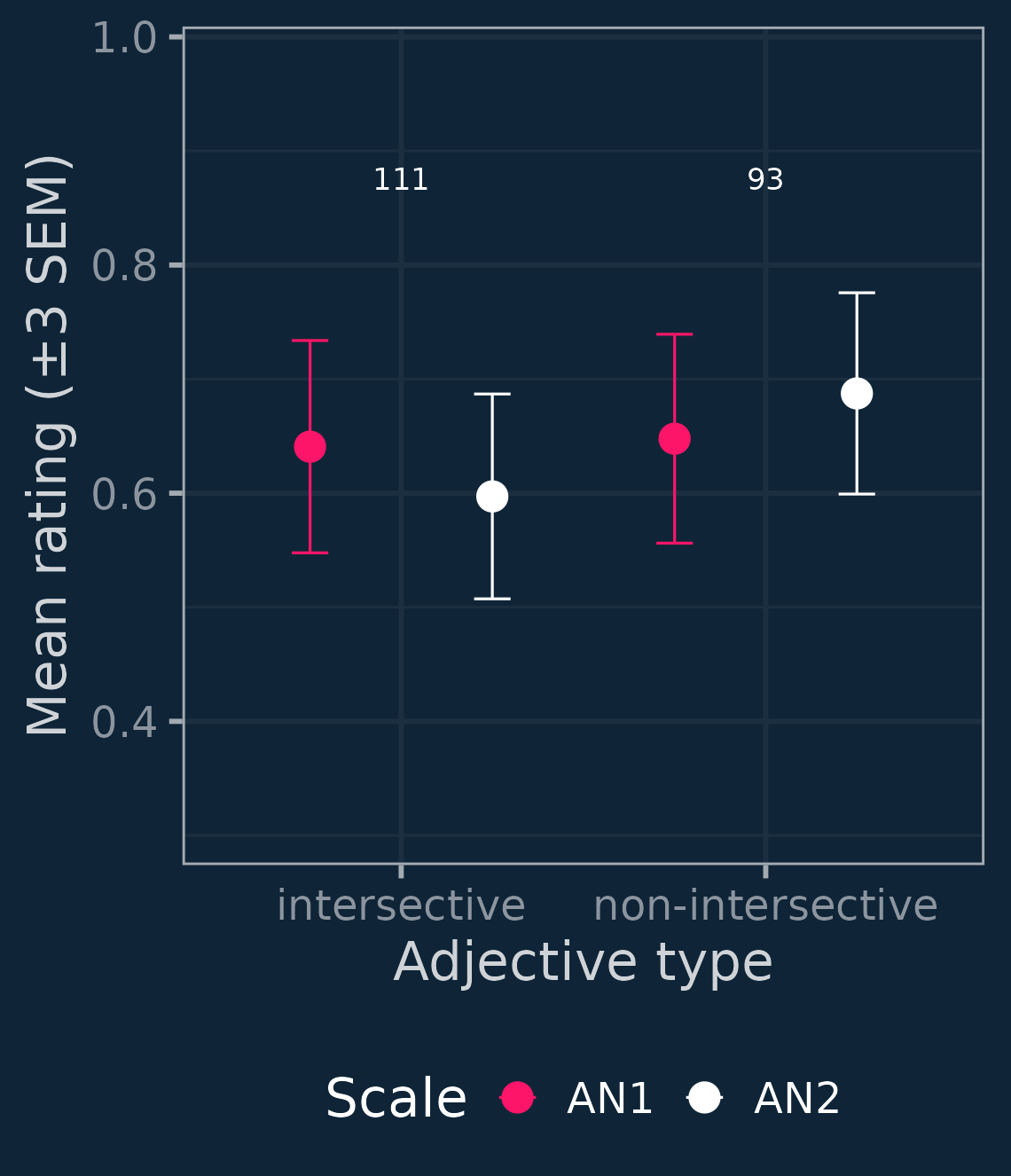
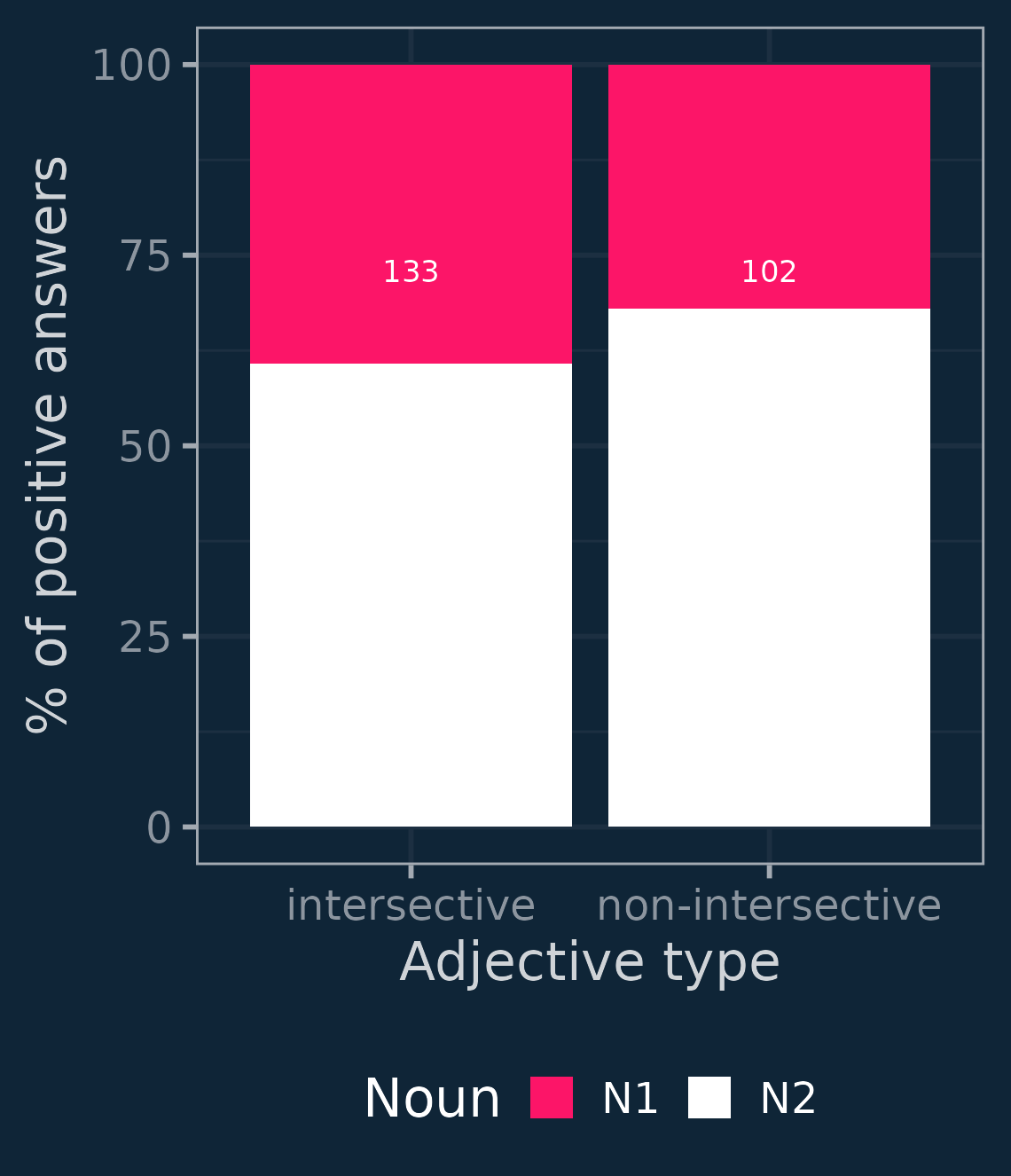
Adjective semantics
gegrillter Gemüsemix
grilled vegetable mix
participial
tropischer Pflanzenliebhaber
tropical plant lover
qualitative
lateinische Wortkunde
Latin lexicography
relational
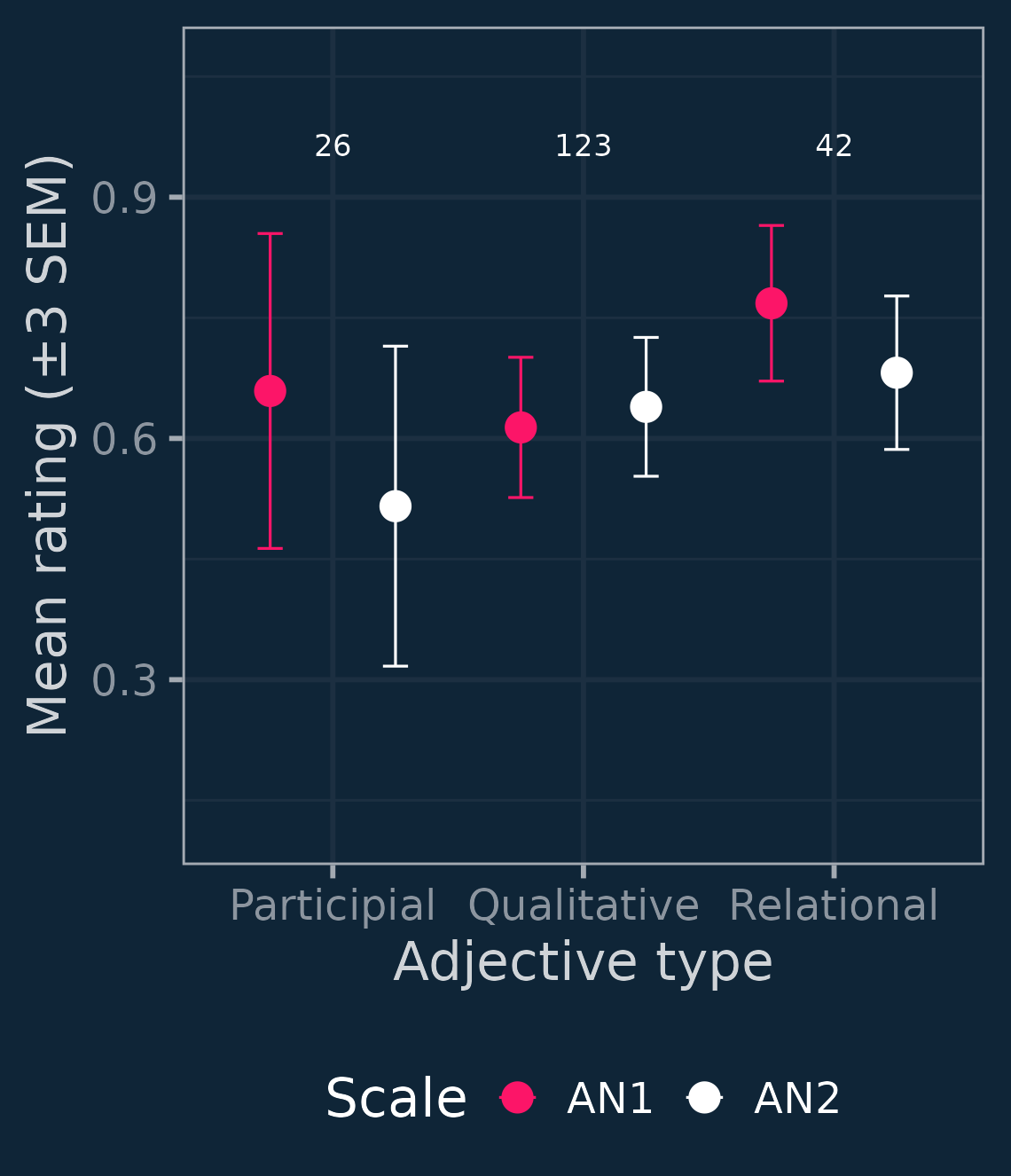
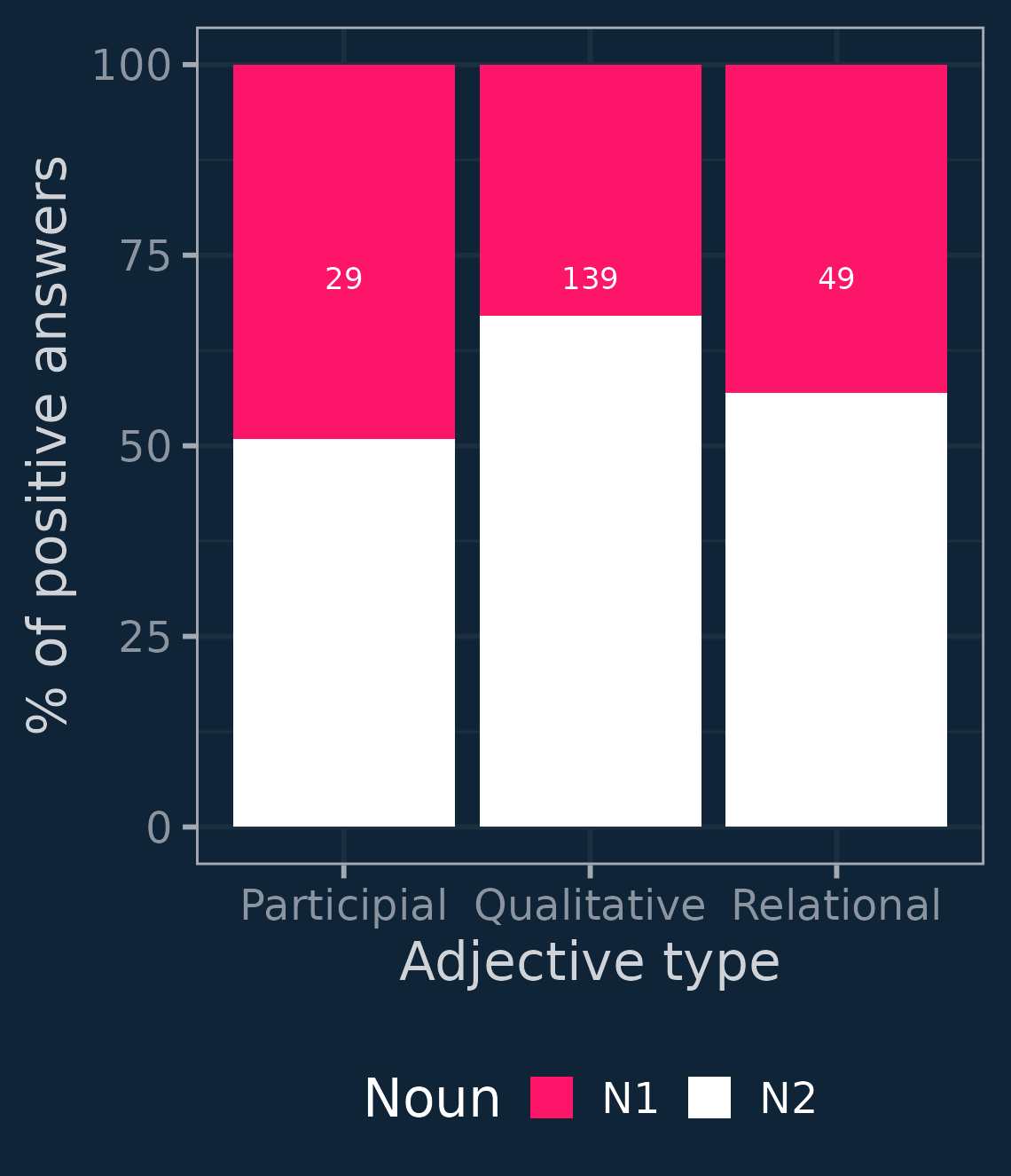
Compound noun interaction
A Catholic church leader is probably Catholic. Pastafarian

katholisches Kirchenoberhaupt

(Self-paced/Eyetracking during) reading study
Die Forscher suchten nach wissenschaftlichen Versuchspersonen für ihre Sprachstudien.
Die Forscher suchten nach wissenschaftlichen Versuchspersonen für ihre Sprachstudien.
The researchers were looking for participants for their language studies.
Thank you
Bonus: Experiment 3
Can the adjective modify both nouns in a compound noun?
Is it only ever either N1 or N2?
What if the adjective attaches to N1, N2, or both?
Ukrainian prince(ly) tomb
More answer options →
More freedom →
More comprehensive picture
Attachment preference: Predictions
Strict compositionality: N2 is the head noun.
Experiment 2: There will be a variety of interpretations.
N2 is chosen more often than N1
N1 is chosen more often than N2
N1 is chosen as often as N2
? chosen often
Canonical
Bracketing paradox
Ambiguous
no interpretation
Attachment preference: Results
More ✔ answers than in Experiment 2 and attachment to both nouns.
As in Experiment 2, there were predominantly N2 answers, but N1 was chosen equally or more often for some items.
Yes-answer likelihood: Predictions

Head position, good semantic agreement between the adjective and a noun → ✔ answers

Good semantic agreement between the adjective and both nouns → ✔✔ answers
(Ambiguity, attachment to both nouns?)
✔-answer likelihood: Predictions
The semantic compatibility ratings should correspond to the reference noun.
Adjective N1 → fewer ✔ for N2
Adjective N2 → fewer ✔ for N1
✔-answer likelihood: Results
Semantic agreement ratings align with the attachment preference.
Good semantic agreement between the adjective and a noun → ✔ answers
Adjective N1 → fewer ✔ for N2
Adjective N2 → fewer ✔ for N1
AN1 must be a great fit.
AN2 must fit a bit.
✔✔-answer likelihood: Results
In 13% of cases, the participants gave both nouns ✔

Catholic church leader

Celtic prince(ly) tomb

military occupation base
✔✔-answer likelihood: Results
Semantic adjective-N1 agreement increases double-✔
Semantic adjective-N2 agreement has a weaker influence
If both nouns fit the adjective, double-✔ probability is highest.

Französisches Revolutionstribunal
French Revolutionary Tribunal

umweltfreundliche Windenergie
environmentally friendly wind energy

blaues Glasauge
blue glass eye
Summary
The canonical N2 interpretation is the default one, as expected by compositionality rules.
Nouns that semantically match the adjective receive positive responses. The hurdle is very high for bracketing paradoxes and very low for canonical phrases.
Ony if the adjective and N1 fit well semantically is a positive response be given for both nouns.
Analyses
Experiment 1
| Parameter | Est. | CrI low | CrI high | Rhat | ESS |
|---|---|---|---|---|---|
| Intercept | -3.78 | -5.33 | -2.34 | 1 | 3608.82 |
| AN1 rating | 3.06 | 1.36 | 4.88 | 1 | 3599.17 |
| AN2 rating | 5.99 | 4.28 | 7.82 | 1 | 3554.80 |
| Morphosynt. match | -0.44 | -1.50 | 0.63 | 1 | 4343.46 |
| AN1 rating × AN2 rating | -3.60 | -5.77 | -1.54 | 1 | 3599.28 |
| AN1 rating × Morphosynt. match | 0.62 | -0.29 | 1.52 | 1 | 5127.36 |
| AN2 rating × Morphosynt. match | 0.04 | -0.89 | 0.98 | 1 | 5097.54 |
Experiment 2
| Parameter | Est. | CrI low | CrI high | Rhat | ESS |
|---|---|---|---|---|---|
| Intercept | -1.87 | -3.32 | -0.44 | 1 | 4193.23 |
| AN1 rating | 3.84 | 2.23 | 5.46 | 1 | 4250.93 |
| AN2 rating | -1.97 | -3.53 | -0.41 | 1 | 4273.96 |
| Morphosynt. match | -0.24 | -1.49 | 1.00 | 1 | 4819.33 |
| AN1 rating × AN2 rating | -1.06 | -2.84 | 0.76 | 1 | 4412.81 |
| AN1 rating × Morphosynt. match | 0.33 | -0.70 | 1.40 | 1 | 5380.05 |
| AN2 rating × Morphosynt. match | 0.58 | -0.51 | 1.67 | 1 | 5128.95 |
Experiment 3: One “yes” answer
| Parameter | Est. | CrI low | CrI high | Rhat | ESS |
|---|---|---|---|---|---|
| Intercept | 1.13 | 0.15 | 2.12 | 1 | 4834.79 |
| AN1 rating | -2.81 | -3.94 | -1.72 | 1 | 4793.24 |
| AN2 rating | 2.95 | 1.85 | 4.02 | 1 | 4768.11 |
| Noun position | -2.70 | -3.42 | -1.98 | 1 | 5056.62 |
| AN1 rating × AN2 rating | 0.47 | -0.83 | 1.77 | 1 | 4811.83 |
| AN1 rating × Noun position | 5.86 | 5.25 | 6.47 | 1 | 5557.05 |
| AN2 rating × Noun position | -5.06 | -5.70 | -4.42 | 1 | 5501.25 |
Experiment 3: two “yes” answers
| Parameter | Est. | CrI low | CrI high | Rhat | ESS |
|---|---|---|---|---|---|
| Intercept | -3.11 | -3.88 | -2.38 | 1 | 1960 |
| AN1 rating | 1.05 | 0.70 | 1.45 | 1 | 3984 |
| AN2 rating | 0.40 | 0.07 | 0.78 | 1 | 3469 |
| AN1 rating × AN2 rating | 0.33 | 0.02 | 0.63 | 1 | 3956 |